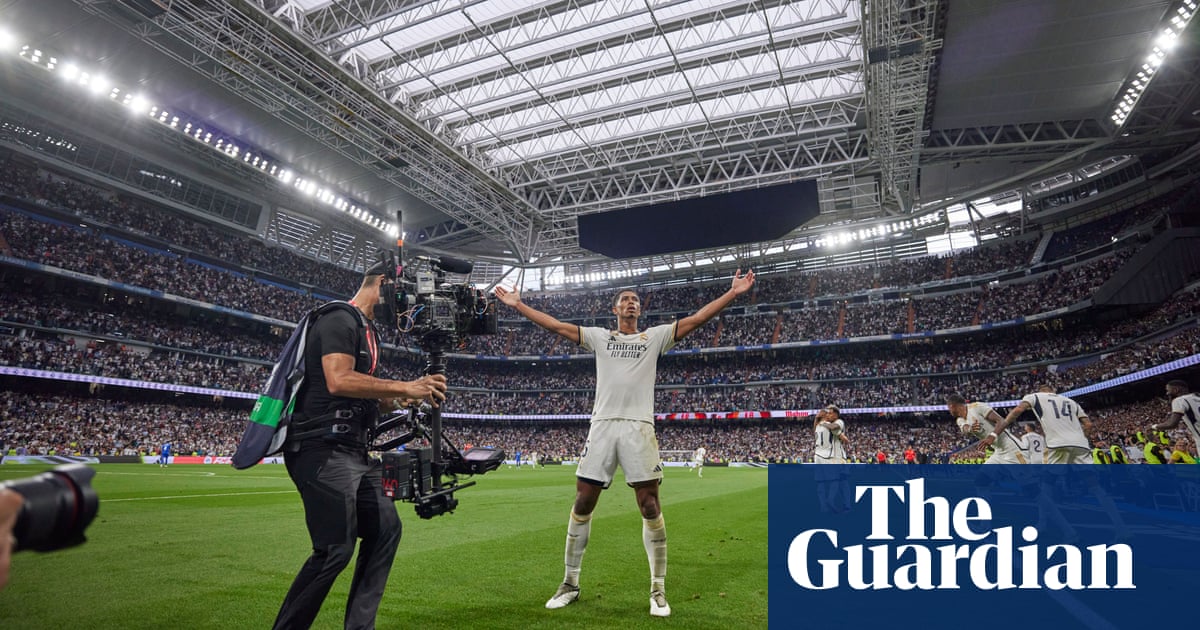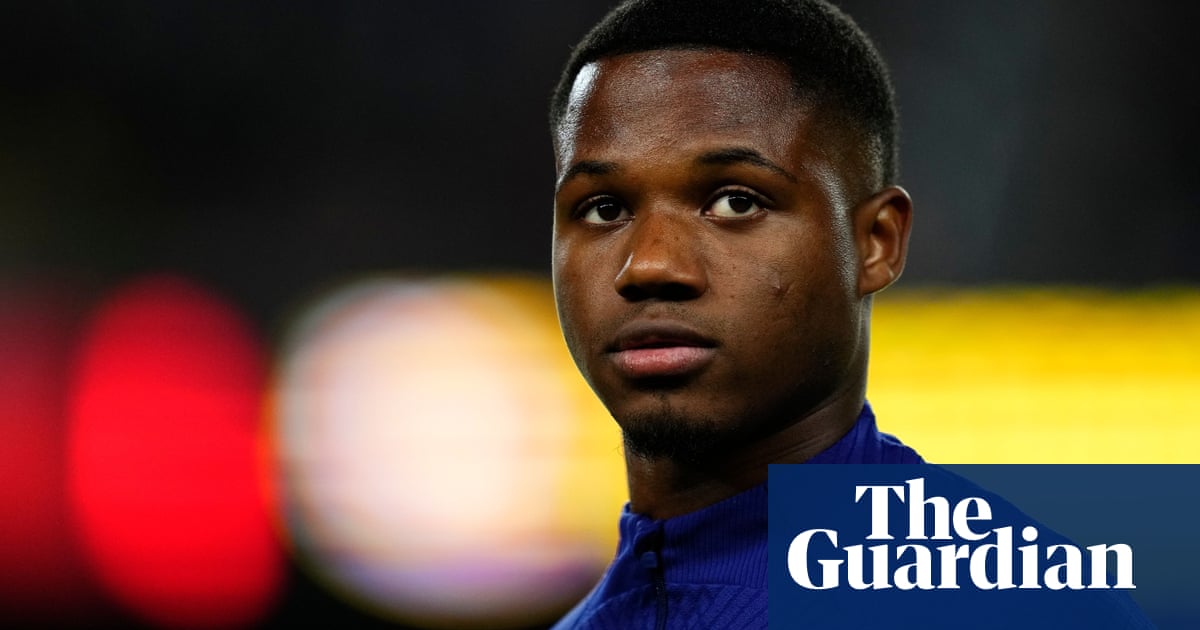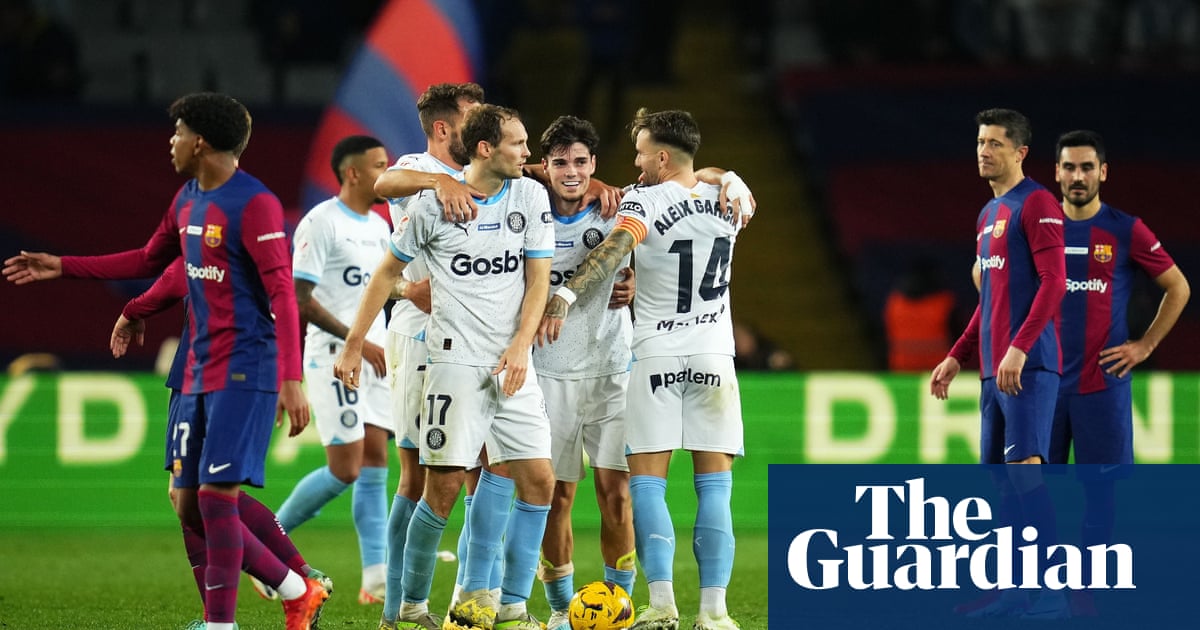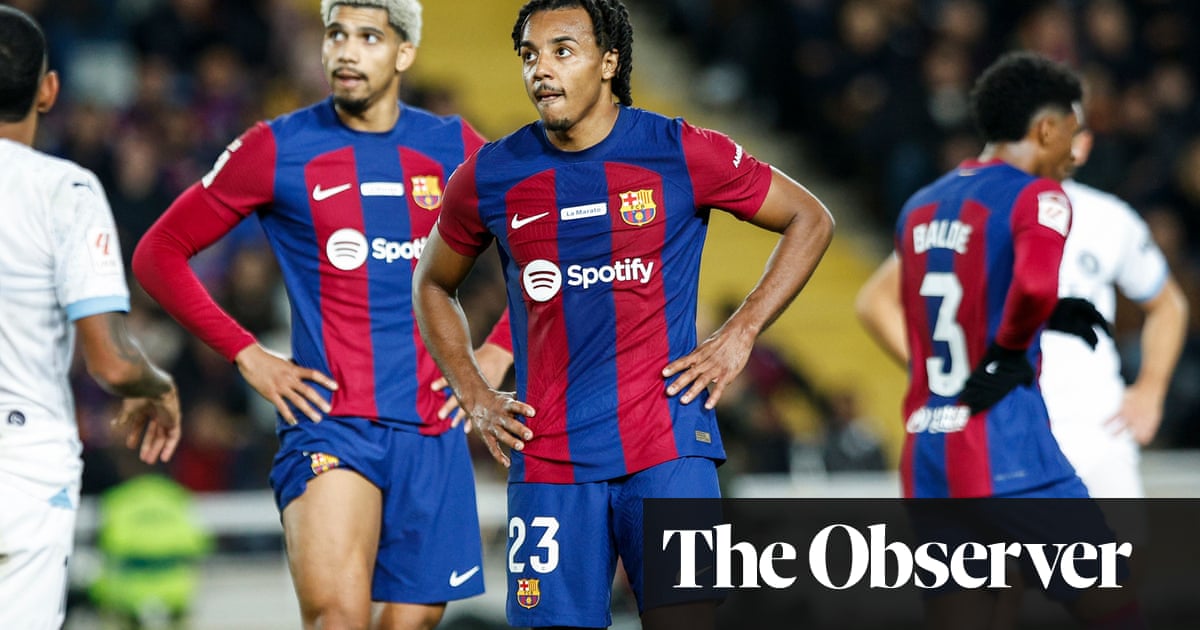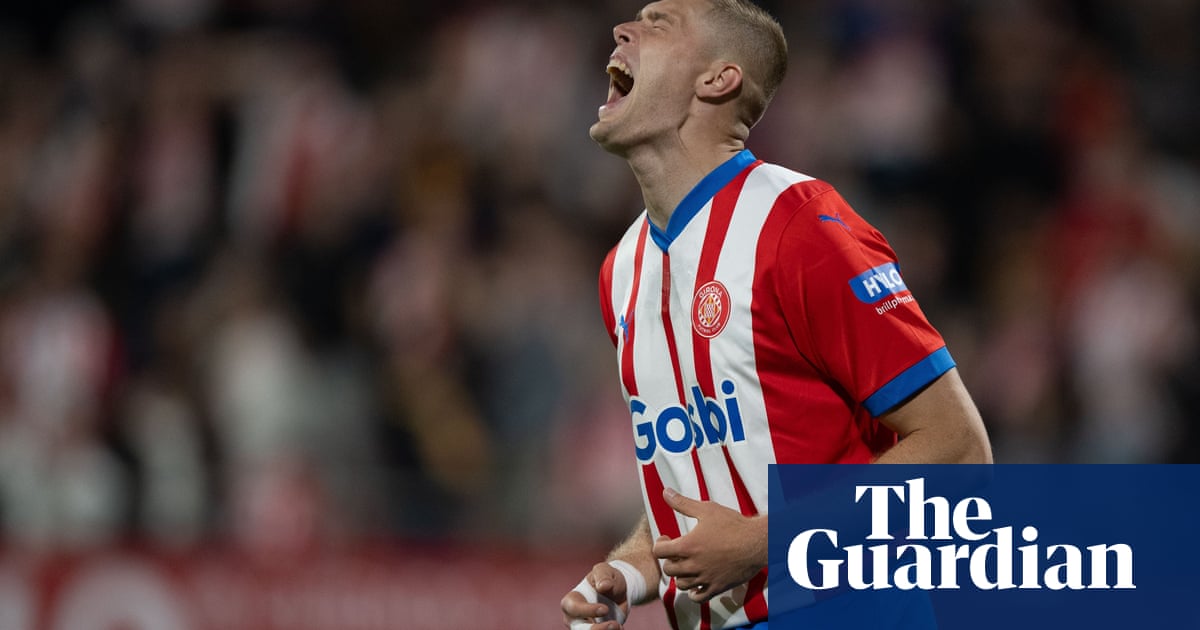
The nets where Barcelona had scored four times, twice at the north end, twice at the south, had been unhooked and hung flat. The benches had been vacated, bottles and bits of tape lying everywhere. Around the pitch, circled by those plastic chairs, people packed away another clásico. The Santiago Bernabéu was quiet except for the lawnmower crossing the grass until it was broken by a cheer, the sound of embraces. The players were on the bus but Joan Laporta, Jordi Cruyff and Mateu Alemany were by the tunnel taking it all in when Xavi Hernández appeared.
An hour after the final whistle, heading towards midnight and long after everyone else had gone home, there was time for one last look and more bear hugs. It really had happened: Barcelona had beaten Real Madrid 4-0, which is why there was time for pictures too, Xavi and his staff lined up for a team photo: a memento for the kind of moment most people thought wasn’t coming back. Not this soon, at least. But then Laporta isn’t most people and nor, it is becoming very quickly clear, is Xavi.
During Barcelona’s presidential race just over a year ago, Laporta had erected a huge banner that covered the facade of a 15-storey building within view of the Bernabéu, his face smiling out, mischief in his eye.
“Looking forward to seeing you all again,” the slogan ran, and that turned out to be one electoral promise he would keep. On his first visit to the Paseo de la Castellana since becoming president for a second time, Xavi’s first as coach four months after taking over and the first clásico there for 749 days, had gone even better.
“Historic,” Xavi called it. This was a night, the Barcelona manager said, that “reminded us of many games a long time ago.” He had been involved in many as a player and now he had done it as a manager. It was one that might not have mattered all that much mathematically – Madrid are 12 points ahead of Barcelona, a fact that may have played a part in the result – but it still felt like it sits with their best derbi moments, their story.
As a coach, Johan Cruyff had the 5-0 in 1994, emulated by Pep Guardiola’s team in 2010. Rinus Michels had a 5-0 in 1974 with Cruyff the player; Frank Rijkaard had the 2005 night the Bernabéu gave Ronaldinho a standing ovation, Guardiola also had the 6-2 in 2009 and Luis Enrique had the 4-0 in 2015.
On Sunday, Xavi had one of his own.
Not that the score alone tells this story. Madrid’s Nacho Fernández summed it up as “a very bad game from us, a very good game from them,” while their coach, Carlo Ancelotti, explained it by saying: “Simply, they played better than us,” admitting “everything went wrong”. The headlines in Madrid inevitably took inspiration from their kit, which wasn’t white or deep purple, to call this a “black night”. Thibaut Courtois called the performance unacceptable.
But that didn’t tell the story either, even if it was true.
It could have been more than four: Barcelona had 17 shots, missed a handful of one-on‑ones and Courtois had made six saves. Barça were winning 4-0 but were also furious, keen to impose a competitive culture, a relentlessness; aware that this was an opportunity to do something really, really silly.
It was pretty silly anyway. Asked to define it, Xavi said: “I’ll let you, the media, do that,” and so they did. Sport’s cover simply said: “Marvellous!!” The former Barça striker Pichi Alonso declared it “right up there with the 0-5 and the 2-6”. Mundo Deportivo declared it a “meneo”: they had given Madrid the runaround. It was, as Santi Giménez put it in AS, a señor baño: not a men’s toilet, although you can insert your own joke here, but a “bath”. A kicking, a drubbing, a destruction.
The Barça centre-back Eric García said the players couldn’t believe their eyes in the first half, that’s how good they had been. But it was more even than the quality of the football, the feeling of superiority, the tactics, or the quiet that came over the Bernabéu; it was the way it linked to those other games, the symbolism, the identity The moment. It was who, what and where but it was when too. Which is why there is another Bernabéu victory where parallels might be sought.
In April 2004, Barcelona beat Madrid 2-1, Xavi scoring the winner. It was too late for them to win the league – they did overhaul a collapsing Madrid, but Valencia took the title – but it reaffirmed their revival in the second half of the season and set them up to win the league the following season, and the season after that. The confirmation they could compete, an identity forming, a path laid before them.
Much like now, or at least that’s how this felt, however fleeting that might ultimately prove.
“We needed this,” Xavi said. It was four months to the day since he took charge of his first game, at a time of crisis for the club. In his first clásico, in the Spanish Super Cup in Saudi Arabia, he had taken comfort in defeat, convinced that something was building. That drew a lot of laughs from a lot of folk, but strengthened by Dani Alves, Ferran Torres, Adama Traoré and Pierre-Emerick Aubameyang arriving in the winter window, with Pedri fit again and with Ousmane Dembélé rehabilitated, at least for now, Barcelona have lost once since then, against Athletic Bilbao in the Copa del Rey.
They came into Sunday’s clásico unbeaten in 11, having scored four goals five times in that period. Still, this was supposed to be different, a proper test of how good they are, whether the revival is real.
“We come from a period when we couldn’t win,” Busquets said. After five consecutive clásico defeats, Barcelona didn’t just win, they won like this.
A coach with less than half a year’s European experience had taken apart Ancelotti’s side, better than them “in every respect”, as Nacho put it.
Xavi, the papers agreed, had got his PhD at the Bernabéu, his team flying already. “Ay, if only you had come sooner,” Sport wrote. “The Xavi era begins,” said El Mundo. “Barcelona are back,” ran the headline in El País.
Those are papers, you might say, and you’d be right. So here are the players. “We are back,” Gerard Piqué wrote immediately after the final whistle.
Not back in the title race, just back.
“We are very far from winning the league but, OK, we need to believe: this is the way. We showed everybody that we are coming back,” Xavi said.
“It’s the beginning of a new era for Barcelona and it’s great for the club,” said Aubameyang, who had coolly clipped in the fourth, ran behind the goal, collected a red ball passed to him by a friend in the front row and posed like Son Goku from Dragon Ball, the Japanese manga and anime adventures.
“When you have the ball you can dream and I dreamed of winning and scoring,” he said, later tweeting a picture of the celebration and the line: “Hello from the finished player.”
There was a gorgeous assist, too. “Ferran called me, I said: OK, I think he is alone,” Aubameyang said, a smile taking over his entire face. “In the beginning I was going to shoot but when I hear him, I think he is better placed than me.”
That is nine goals in 11 games since he arrived. “To tell the truth I was expecting to do something good,” he said, “but it’s definitely going even better than I expected.”
That goes for all of them, bounding around the dressing room chanting: “Being Barcelona is the best thing there is.” For a while, it didn’t look that way; maybe now it can be again, and earlier than anyone expected. “We dream a lot and dreaming is free,” Alves insisted. If, that is, they could sleep at all.
The crisis remains real at the club, but something is shifting and this was a moment that will always be there, “something to enjoy” as Xavi put it. “Beyond being the manager, I’m a culé [fan of the club]. We haven’t been winning many titles recently so this is a moment to celebrate,” he said.
Outside, Laporta was waiting: he had been looking forward to seeing this place again and he wasn’t planning on going anywhere just yet.
Xavi and his staff headed back out to the pitch to take a picture of themselves on a familiar stage, where they hoped a new era had just begun.




